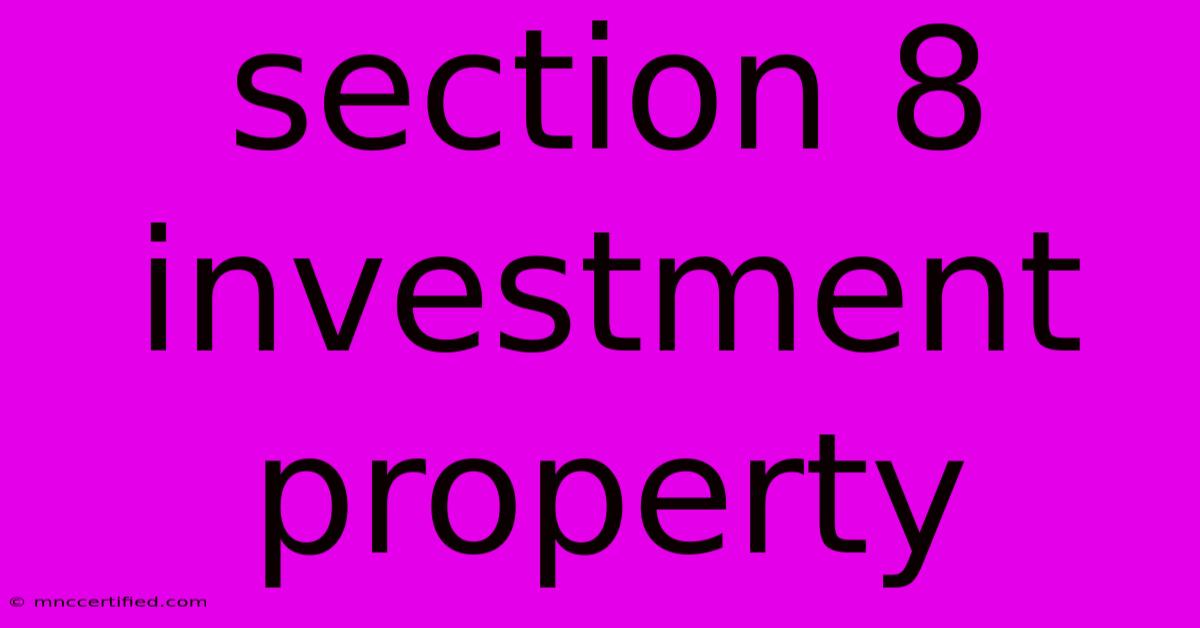Section 8 Investment Property

Table of Contents
Section 8 Investment Property: A Comprehensive Guide for Investors
Investing in real estate can be lucrative, but navigating the complexities of the market requires careful planning and understanding. One potential avenue for investors is the Section 8 program, a government-funded voucher program that assists low-income families in affording housing. However, investing in Section 8 properties comes with its own set of advantages and disadvantages. This comprehensive guide will delve into the intricacies of Section 8 investment properties, helping you make informed decisions.
Understanding the Section 8 Housing Choice Voucher Program
The Section 8 program, officially known as the Housing Choice Voucher Program (HCVP), is administered by the U.S. Department of Housing and Urban Development (HUD). It provides rental assistance to eligible low-income families, the elderly, and people with disabilities. Instead of providing housing directly, the program offers vouchers that tenants can use to pay rent at participating private landlords.
How Section 8 Works for Landlords
As a landlord participating in the Section 8 program, you agree to rent your property to a tenant whose rent is partially or fully subsidized by the government. The tenant pays a portion of the rent (typically 30% of their adjusted gross income), and the Section 8 voucher covers the remaining amount, up to a pre-determined payment standard. This payment standard varies by location and unit size.
Advantages of Investing in Section 8 Properties
Investing in Section 8 properties offers several compelling advantages:
-
Guaranteed Rent: One of the most significant benefits is the near-guaranteed rent payment. As long as the tenant meets their obligations and the property adheres to program requirements, the Section 8 voucher ensures consistent rental income, mitigating the risk of vacancy and late payments.
-
Reduced Tenant Turnover: Because tenants receive significant rental assistance, they're less likely to move frequently, leading to lower turnover costs associated with advertising, screening, and cleaning between tenants. This stability translates to increased long-term returns.
-
Lower Risk of Eviction: While evictions can still occur for legitimate reasons (e.g., lease violations), the process is often more streamlined as HUD provides resources and guidance for landlords.
-
Potential Tax Benefits: Depending on your specific situation and tax laws, owning rental properties may offer various tax benefits, including deductions for depreciation, mortgage interest, and property taxes. Consult with a tax professional for personalized advice.
Disadvantages of Investing in Section 8 Properties
While the advantages are considerable, it's crucial to acknowledge potential drawbacks:
-
Stricter Requirements: Participating in the Section 8 program requires adhering to HUD's guidelines, including specific property standards and tenant screening processes. Failure to comply can lead to penalties or removal from the program.
-
Longer Tenant Screening: The screening process for Section 8 tenants is often more extensive and time-consuming than traditional tenant screening, which can delay occupancy.
-
Potential for Property Damage: While not inherent to Section 8 tenants, there is a risk of increased property damage if proper tenant screening and regular property inspections aren't conducted.
-
Administrative Burden: Managing Section 8 properties involves additional paperwork, regular inspections, and communication with HUD, requiring more administrative effort than managing traditional rentals.
Finding and Managing Section 8 Tenants
Finding qualified Section 8 tenants requires working with your local Public Housing Authority (PHA). The PHA will manage the voucher program in your area and provide you with eligible tenants. Thorough tenant screening remains essential, even with the involvement of the PHA, to ensure a positive tenant-landlord relationship.
Is Section 8 Investment Right For You?
Investing in Section 8 properties is not a one-size-fits-all solution. The decision hinges on your risk tolerance, investment goals, and familiarity with property management. Carefully weigh the advantages and disadvantages, conduct thorough research, and seek professional advice from real estate experts and tax professionals before making any decisions. Understanding the local housing market and the specific requirements of your local PHA is paramount for success in this niche market.
Keywords: Section 8, Section 8 investment, Section 8 property, Housing Choice Voucher Program, HUD, rental property investment, low-income housing, real estate investment, rental income, property management, tenant screening, PHA, Public Housing Authority.
Disclaimer: This article provides general information and should not be considered professional financial or legal advice. Consult with relevant professionals before making any investment decisions.

Thank you for visiting our website wich cover about Section 8 Investment Property. We hope the information provided has been useful to you. Feel free to contact us if you have any questions or need further assistance. See you next time and dont miss to bookmark.
Featured Posts
-
Basingstoke Homebase Store Sale Event
Nov 29, 2024
-
Haise On Rangers Health Scare
Nov 29, 2024
-
Ariana Madix Thanksgiving Parade Debut
Nov 29, 2024
-
Georgia Investment Tax Credit
Nov 29, 2024
-
The Saudi Investment Bank Atm
Nov 29, 2024